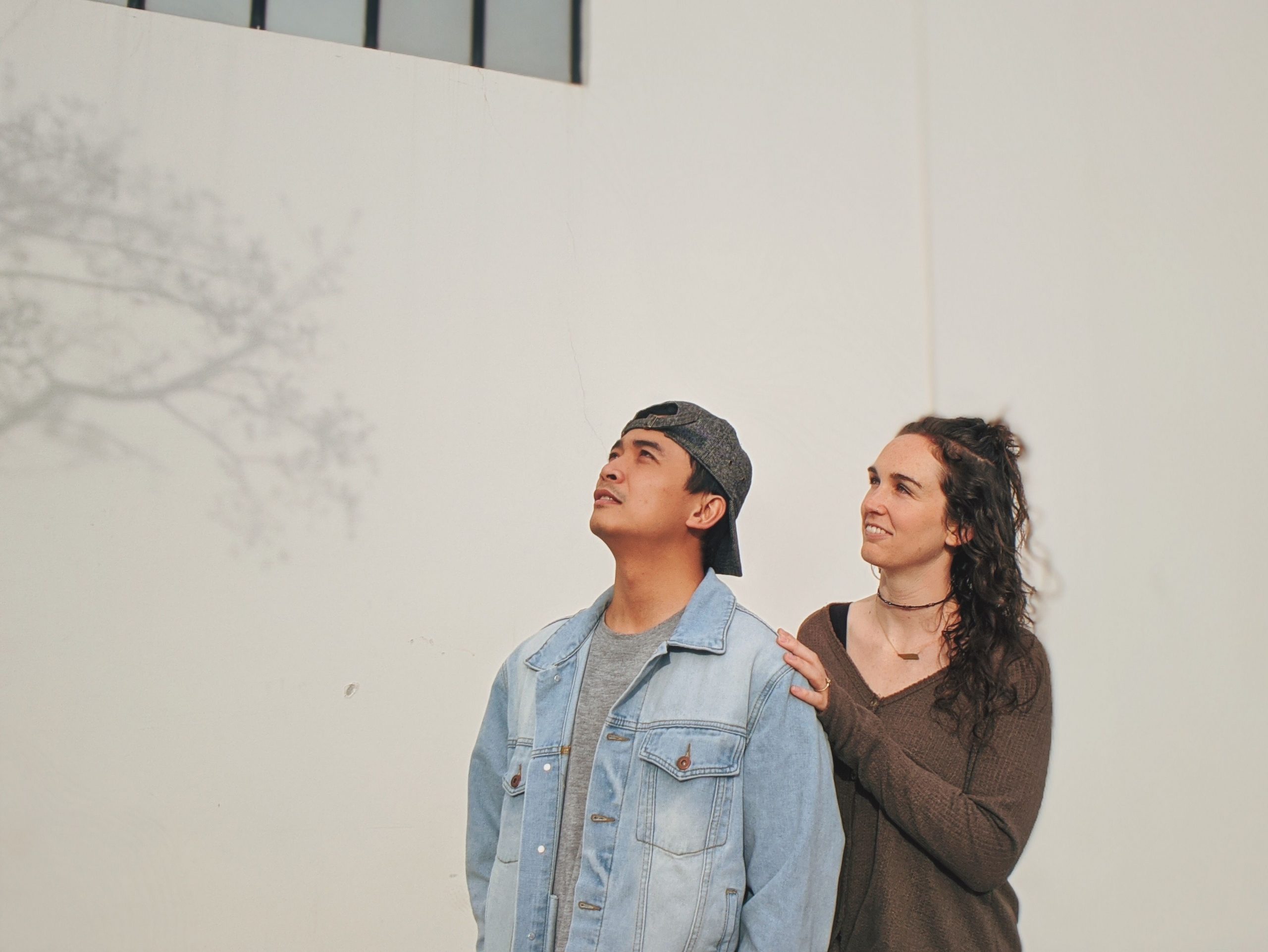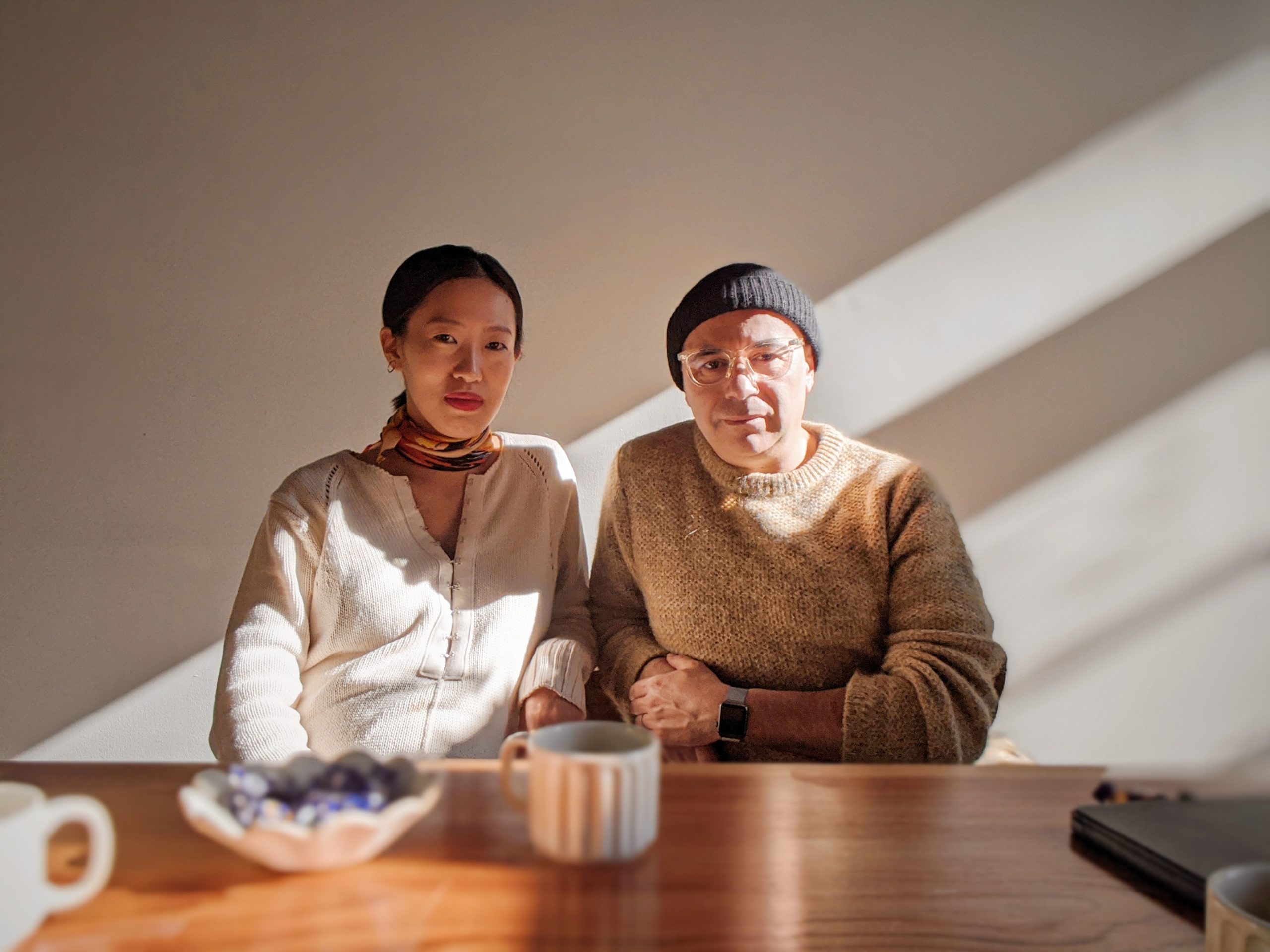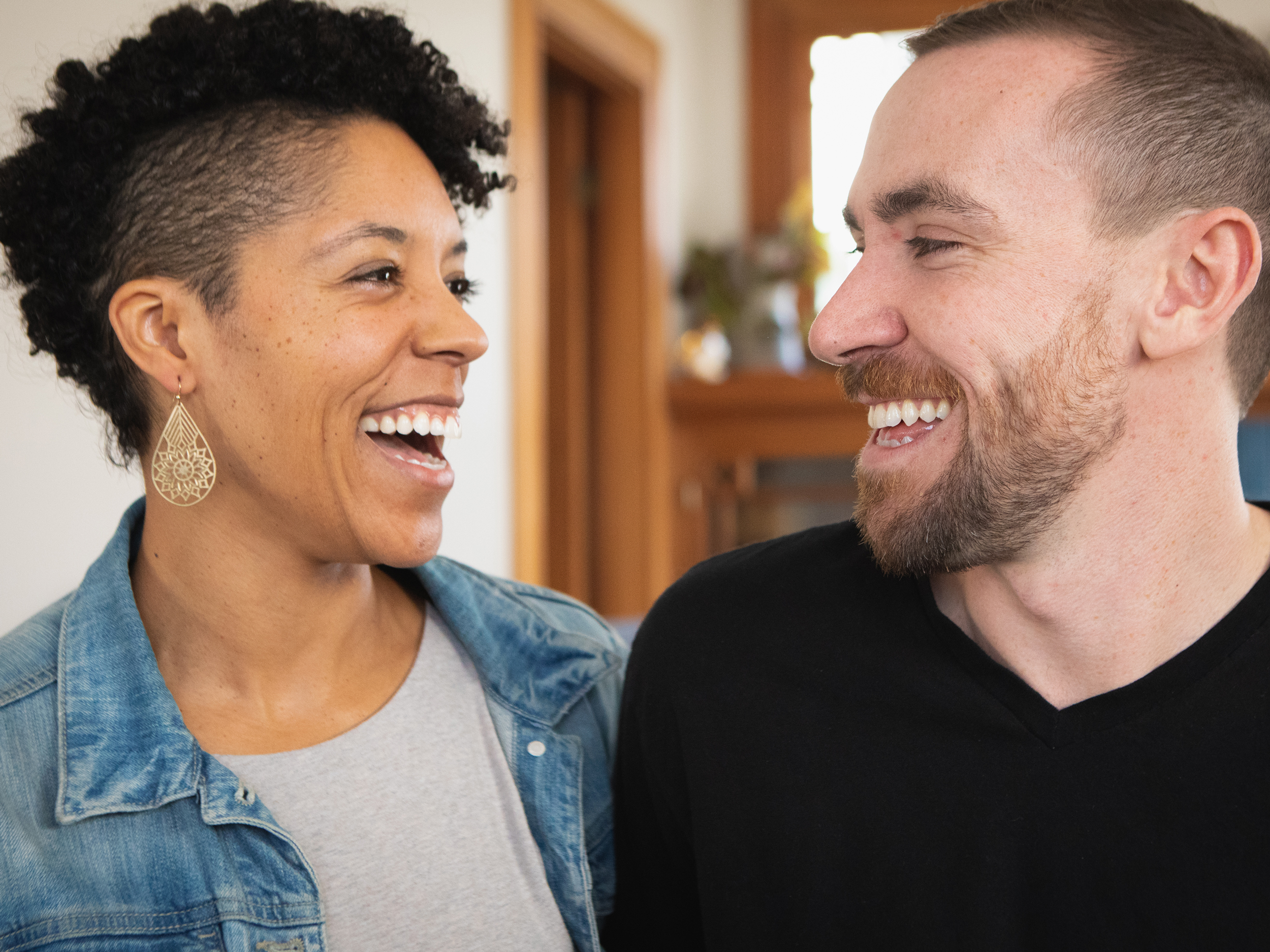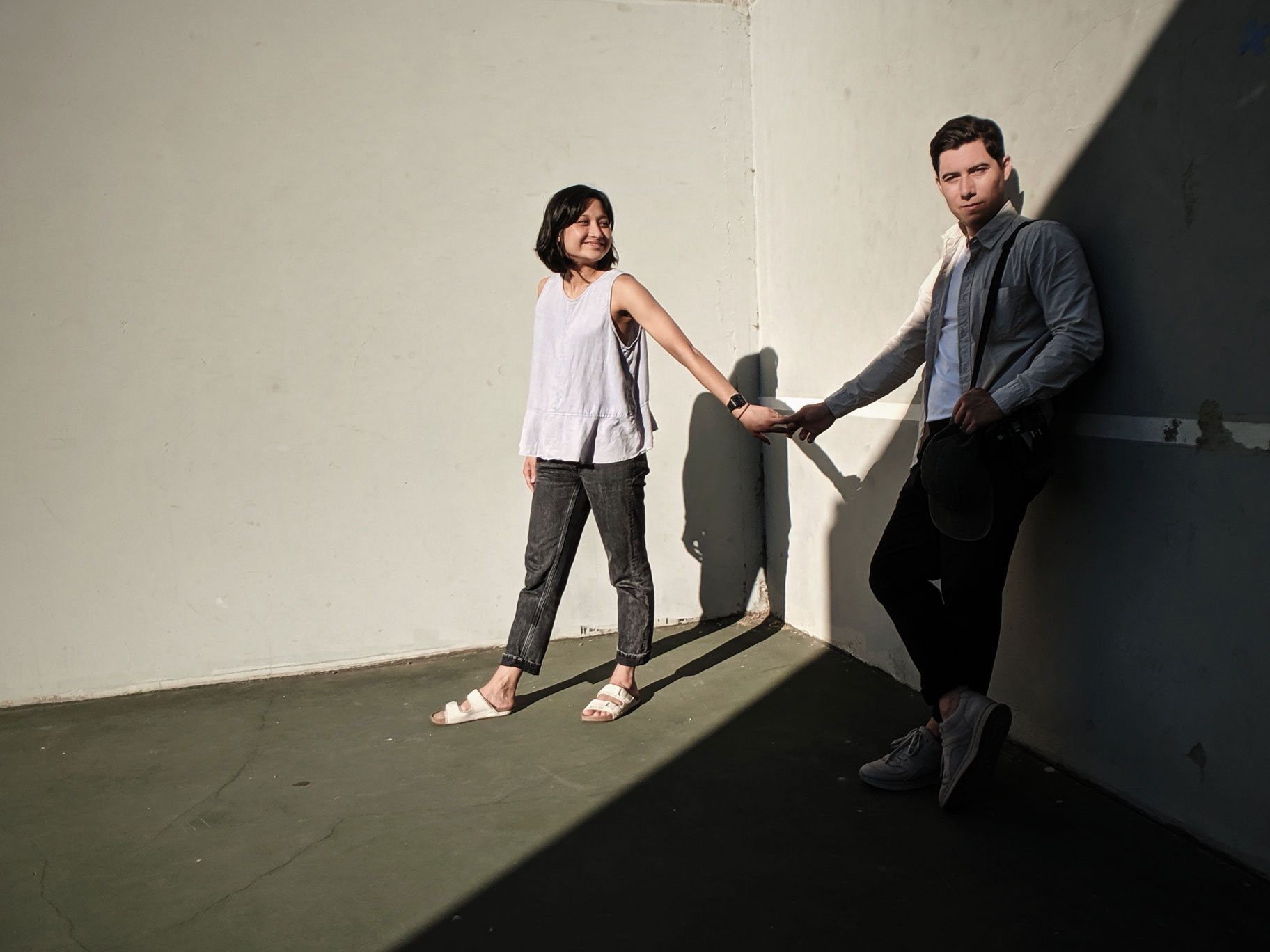Marcie & Simon
About the couple
Marcie runs Black Coffee with White Friends and creates history lessons for adults through Mockingbird.
Simon is a lettering artist and sells custom fonts through his foundry Beasts of England.
Interview
By Justin and Nidhi Barber
October, 2020
Photos
None, per request of the couple. "Sky Gradients" taken by César Couto.
Support
Bonsai Partners
Interview
By Justin and Nidhi Barber
October, 2020
Photos
None, per request of the couple. "Sky Gradients" taken by César Couto.
Support
Bonsai Partners
Nidhi: Tell us about the cultural context in which you grew up.
Marcie: I lived in a very Black, African-American home in a suburb of Cleveland. But my family had two homes: my mother had a home in a Black neighborhood, and my grandparents had a home in an all white neighborhood. My grandfather was very fair skinned, so I think he was able to buy a house in a neighborhood that maybe didn't know that he was Black...until family started to show up.
We went to school in the all white neighborhood because the education was better, and then we spent our summers and our weekends with my mother in an all Black neighborhood. We were one of the first families to integrate that school system – Cleveland schools were one of the last schools in the country to integrate. They didn't integrate until 1976, or something.
Both neighborhoods were blue collar, working class family neighborhoods. Neither neighborhood was super fancy, but they were both super proud neighborhoods. These were people who worked for pensions. If they were able to take a vacation the whole neighborhood knew about it, it was a win for everyone. So I went back and forth in between those worlds.

Nidhi: What was it like switching between worlds that were either all white or all Black?
Marcie: In my Black culture it was mostly, “we want you to shine and to be a credit to the race.” At times I'd be criticized for being “too white,” but I think what they were really saying was: “you're forgetting who you are and you're forgetting us.”
Of course, nothing's further from the truth – you are who you are, no matter where you're walking in life.
In my white culture, I had to suppress my Blackness and perform a white narrative just to be able to have friends and be invited places. The way I spoke, the way that I dressed, the music I listened to, what I talked about...
I used to have so much anxiety as a child whenever I’d come back from break to talk about what we did on vacation, because my culture was different. I’d describe what we had for Thanksgiving and I’d hear kids laughing or saying, “that sounds nasty.” It was really hurtful.
So I was a wound up, anxious kid in that sense because I knew I was supposed to “behave” and “be the best” at school which was my parents’ code for: “you are to go to school and not be Black because they won’t understand it. When you're with white people, especially those in authority, you protect your Blackness.” It’s a very interesting thing to look back on as an adult.

Justin: Simon, what was your cultural background growing up?
Simon: I grew up in England. Small town called Bournemouth. Being a British town, and not one of the big ones, it was very white. You know, not something I really particularly thought about too much. I had a pretty “colorblind” upbringing.
My dad was an aircraft engineer, and during that time in England they just weren't making all that much. But in America they were paying them substantially more and they needed his skillset.
A lot of my dad's friends had kind of beaten him to the punch, they were moving all over the States. So I was constantly telling my friends, “oh, we're going to move to San Diego,” or “Colorado,” or “Canada.” So when San Antonio came around, nobody believed me. I was the boy who cried wolf!
One kid who'd actually visited America a few times pulled me aside and told me, “listen, I’ve got you sorted. I’m gonna give you these magazines I have so you can learn about American culture.” So he gave me Mad Magazine, and in one of the articles it broke down all the different social categories of a typical American High School: the jock, the princess, the nerd, the stoner…
So I was 15 when I moved to San Antonio. I went in as a sophomore, and I got home from my first day of school and my mom asked, “how was it?” I ran upstairs and brought the magazine down. “This is what I just dealt with, this was my day!” I mean it was incredible, you could fit everyone into those categories. With the addition of the cowboy!

Justin: Moving to a different country at that age is difficult. What kind of culture shock did you experience?
Simon: Yeah, San Antonio in the ‘80’s was a bit of a culture shock but I was mostly excited about it. So it wasn't this terrifying proposition, it was a pretty cool thing to be moving to the States. You know, I thought I was going to have hamburgers every day. I figured everybody would get a gun, which as a 15 year old is a cool thing.
[laughter]
The hardest part was definitely going to school. Man, yeah, that first day of school. My first class was journalism and they told us that we'd have to give an oral presentation. That terrified me at a normal level to begin with, but I felt like, “okay, I can deal with this.”
So a couple days later I gave my little presentation and everybody went nuts because of my accent. They went bananas, but I didn't enjoy it. I was very, very introverted. Still am in a lot of ways. That was difficult.
That’s when I subconsciously decided that I wasn't going to speak like that anymore. My sister was 17 when we moved here and she still sounds strongly English, but I was more willing to embrace my new norm.
Marcie: I know you don’t have a very strong accent, but it’s the rhythm in which you speak and the word choice that gives you away. I think it’s a lovely thing.
Simon: I think so too. It’s usually the words that don’t come up in everyday conversation. Like I say “garden” instead of “yard,” or “nappies” instead of “diapers.”
Marcie: It’s funny because we’ve been married ten years now and to this day our daughter Nadia and I will look at each other and be like, “what are you talking about?” Simon will say, “what do you mean! Of course Americans say that."

Nidhi: How did you meet?
Marcie: This is our second final marriage, I guess is how I’d say it. I was living in Chicago with my daughter in a neighborhood called Lincoln Square. It’s a literal square where people would gather; there's a fountain, a bakery, an ice cream shop.
I would walk through the square with Nadia to get to the train, and I’d see Simon’s sister who’s this beautiful, blonde, British woman with her gorgeous, Native American-Japanese-British children. Our kids started playing together but I just didn't want anything to do with her. I was a divorced person and a little bitter about the whole thing. Like, I don’t need beautiful couples in my life right now, I need angry, bitter women.
So I would shoot down any kind of friendship she was throwing my way. But I had a nanny at the time who was also a friend of mine and she told me, “it’s time for you to have a friend who’s a mom.”
So I went to a Halloween party his sister invited us to, and then I started having Bible study together with her and this group of women. We became really close, our kids became close. They became a solid foundation for me, and a really good picture of what marriage could be – which I didn’t have prior to getting married.
And she kept talking about this brother of hers. She’d say all these lovely things about him and I’d think, “I don’t want to be the one to tell you, but I’m sure he’s a monster.”
He came to visit from Texas, and we hit it off immediately. I saw him and thought, “oh he’s cute.” But at that point he was kind of starting to date someone else, so I had it in my mind that I was just going to be this creepy, older woman who flirts with my friend’s brother. “I call dibs on that role.”
[laughter]
Marcie: I really thought he was a little out of my league. I’m 100% the type of person to show up wearing a prom dress for no reason, so I thought I might be too much for him. The day we met I was wearing this dress with a sash, heels, and my hair...and he was coming from Austin, which is super chill. I was just all over the top.
Simon: Meanwhile I’m thinking she's way too good for me. I mean she was glamorous. What really worked for us was that we were in such a good place when we met. I wasn’t really looking, to be honest with you.
Marcie: Same.
Simon: I was newly divorced and had the free time and resources to make a few trips up to Chicago to visit my sister, which became about visiting Marcie. But I was still in Texas, so I didn’t know how it was going to work. It's hard to imagine, but even 10 years ago social media wasn't what it is now. There was Facebook. So in my mind, I'm thinking, “well, maybe that's the way I can do it.”
Marcie: I was in Marketing/PR at the time and I didn’t think Facebook was going to last. But the chef at the restaurant I was repping asked me to make them a Facebook page, so I set up my own account to test it out first. And Simon was one of the first people who friended me. I did a little squeal, “this really cute boy just friended me! Facebook is amazing!”
Neither of us are Facebook people but we’re both introverts and word people. So we’d write each other these stories about our day and what we were observing, and finally we did a phone date. That was our first date.
Simon: If you do it right, long distance dating is a lot of fun. This was back in Blockbuster Video days, so we’d go rent the same movie, get on the phone, and hit the play button at the same time. We’d tie in the food and the wine. We’d buy and read the same books – which we still do, there’s always one book that we’re sharing. We did that for a while, with the occasional visit. It was a lot of fun. It wasn’t quite a year before we got married.
Marcie: In my family, to marry a white man was strictly taboo because we were told as kids that white men weren’t safe. “Don’t date white men, don’t trust white men with your body.”
When I started dating Simon, my mom – who's passed away – was kind of like, “if that’s who the Lord brought you, well, there you go.” And my sister, I’ll never forget it, she said, “well, it’s not my thing...but it’s your thing.”
[laughter]
Marcie: It’s funny, like it’s not your “thing” to fall in love? That’s exactly what this is, I fell in love. It’s not like I said, “is there a white, red headed British man that I could seduce and marry?” No! I fell in love...there’s no “thing” that happened.
Simon: So that’s how we met.

Nidhi: How did you navigate these conversations around race, culture, and different upbringings as you started dating and in your marriage?
Marcie: The cultural things we found out about each other as we were dating were mostly about being English and American, more so than being Black and white – which was the harder bit for our friends. I had to learn how to navigate the English way of things, the politeness factor. American culture is very “big is better,” while the English are very reticent.
Simon: She was coming into a family situation where our Englishness was ramped up because we’re clinging to it. Especially when me and my sister get together, it just comes up a lot. We’re always talking about English things, TV shows, food, and all that stuff.
I learned early on that if I wasn’t careful, I’d completely leave her out of the conversation. I was just trying to get along with my family – the last thing in the world I wanted was for her to feel isolated – but she did feel isolated.
Marcie: And sometimes offended! I’m an American hearing about how terrible the food is and how terrible we are –
Simon: Which we don't feel at all – we love American culture – I mean I'm more American than English by now, it's crazy to say otherwise.
Marcie: Right.
Simon: But that’s how it could come across, which was hard.
Marcie: There were a lot of times that it was hard for me to share my culture. But Simon’s parents – I just recently told them this – have helped me embrace my Blackness in the same way they embrace their Englishness.
They’ll say all things all the time like, “English people make the best biscuits. And they’re called biscuits.” Before, I was never given permission to hardcore be like, “no, Black people make the best macaroni and cheese!” I never thought you could say that in mixed company!
[laughter]
Nidhi: You mentioned that your Black and white cultures have been more difficult for your friends, what has that been like?
Marcie: The thing they most often don’t understand is how something happening in the news affects us as a couple. It’s not because he’s not on my page or I’m not on his page, it’s because a lot of times there’s a lot of grief in our home. People don’t recognize that. Simon has often said, “I don’t think I would’ve noticed if I weren’t married to you, I wouldn’t feel the pain of it in the same way.”
Simon: One hundred percent.

Justin: What made you decide to shift the race conversations beyond your family into creative work intended for a public audience?
Simon: I don’t even remember the conversation that made me think to ask it, but I turned to her early on in our marriage and asked something like, “do you ever imagine speaking out more about Black issues?” And she went, “eh, not my thing. That’s not what I do.”
Marcie: I had been raised that you did your best and it wasn’t your job to fix things. You played by the rules and tried to make people forget that you were Black. “Don’t start trouble, don’t ask questions.” So I think that was a lingering thing.
Simon: In the meantime she had been dancing around the idea of running a blog of creative stories about her past, a living document of where she came from that she could pass on to our daughter. But she would waffle, going back and forth about what she's gonna do with it or whether she even likes this piece or that piece or not.
I'm reading them all, so I knew she had this incredible talent already. At the same time we were having really intense discussions about life, general politics, faith, whatever is going on in the world –
Marcie: Specifically as a white male and a black woman.
Simon: And I would walk away from our conversations thinking, “my wife has such a voice, she's gotta do something with it.” I didn't know what it was gonna look like. I’d even pray about it, “God, she's got to do something here. This is crazy, I can't be the only person to hear this stuff.”
Then there was one event at Nadia’s school which precipitated you really leaping into this endeavor that you're in now.
Marcie: Nadia was going to a school which was very white, very Christian, very conservative. The school was going to have slave debates...that's how it all started.
So we met with the school about that, and of course after the first meeting they decided they weren’t going to do it anymore. But there were other things that I had not been saying to keep the peace.
My parents were the product of Jim Crow. So my mother, my father, and my grandparents – my grandfather was the son of a slave but born free – all migrated from the South. They all lived under Jim Crow laws. They never talked about it. There are no stories. We have one story of my mother refusing to integrate into a white school. She was so terrified that she got pregnant so that they forced her to get married and she wouldn’t have to go. My sister’s birthday is the day Dr. King was shot. No stories.
There was nothing being said about these major moments, and I decided that I wasn’t gonna leave my kids and my grandchildren like that. I decided to write it all down because I want them to know that I cared and that it mattered. And that they matter.
Simon: It all fell into place really naturally for her. It’s been a joy to see. It’s so gratifying for me to watch her come into her own. And I knew, I just knew it was gonna be big. I always did. I just always did. And here we are. Sorry, I had to gush a little bit there.
Other Interviews

Jami & JoshueBay Area

Yuka & LuisTokyo

Chloe & DylanOakland

Mel & BradyNew York

Nidhi & JustinSilicon Valley
Technicolor is an online magazine celebrating multi-ethnic relationships through conversations and photos.
Created by Justin in California 
Thanks to Bonsai partners